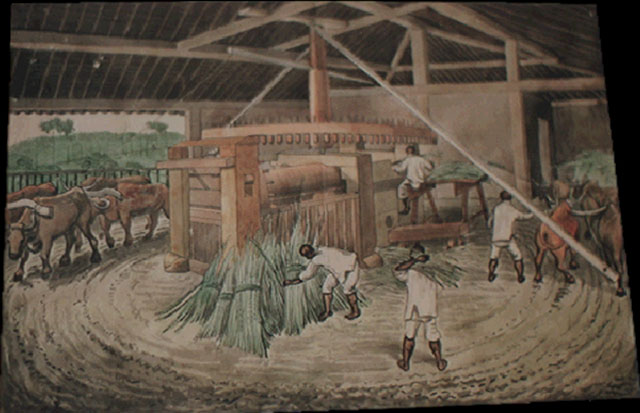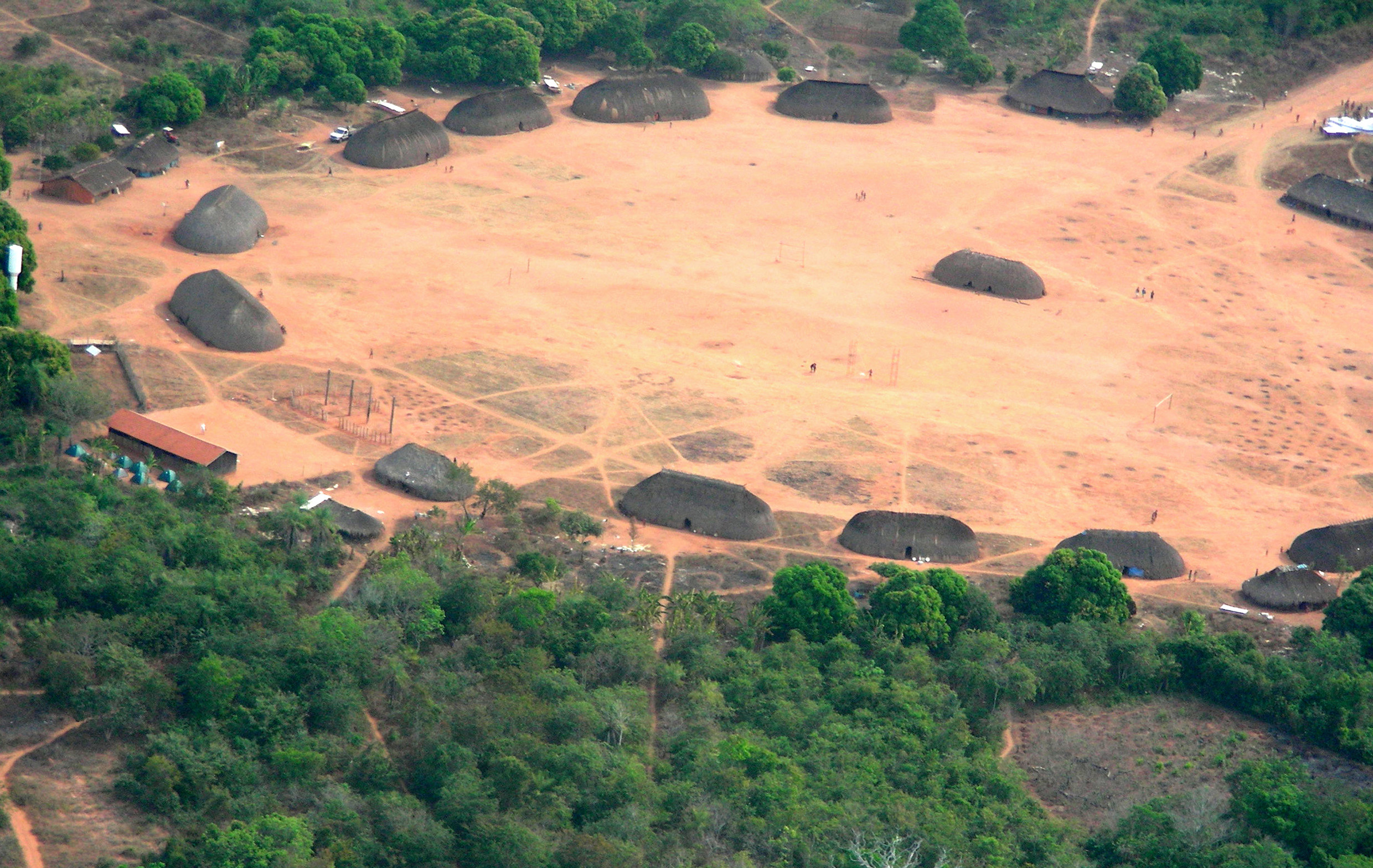|
Apiacá People
The Apiacá, or Apiaká, are an indigenous people of Brazil, who live in northern Mato Grosso, near the border of Pará. They speak an Apiacá language that is a subgroup part of the Tupi-Guarani languages, though many today speak Portuguese. Prior to the 19th century, the Apiacá were a warlike tribe with a heavily agricultural culture. Around the mid-19th century, their numbers began to decline. This decrease coincided with the contact of European settlers in Brazil. Though thought to be extinct, their numbers, today, are increasing. In 2001, there were only 192 Apiaká. As of 2009, there are a thousand Apiaká people. Language The Apiaká language belongs to subgroup VI of the Tupi-Guarani languages. After coming into contact with the Neo-Brazilians, the Apiaca language changed with combined elements of the Lingua Geral, A Tupi-based trade jargon. Today, Portuguese or Munduruku are more widely spoken as opposed to the Apiaca language, though these people have always been kno ... [...More Info...] [...Related Items...] OR: [Wikipedia] [Google] [Baidu] |
Indios Apiaka No Rio Arinos
Indio may refer to: Places * Indio, Bovey Tracey, an historic estate in Devon, England * Indio, California, a city in Riverside County, California, United States People with the name * Indio (musician), Canadian musician Gordon Peterson * Índio, Brazilian football players: ** Índio (footballer, born 1931), or Aluísio Francisco da Luz ** Índio (footballer, born 1972), or Francisco Anibio da Silva Costa, indoor footballer, see 2004 FIFA Futsal World Championship ** Índio (footballer, born 1975), or Marcos Antônio de Lima ** Índio (footballer, born 1979), or José Sátiro do Nascimento ** Índio (footballer, born 1981), or Antônio Rogério Silva Oliveira ** Índio (footballer, born 1996), or Matheus da Cunha Gomes Ethnicities * Indio, a term referring to the indigenous peoples of the Americas * Indio, the Spanish Colonial racial term for the native Austronesian peoples of the Philippines between the 16th and 19th centuries * Indio, the Spanish term for Indian people, and/or ... [...More Info...] [...Related Items...] OR: [Wikipedia] [Google] [Baidu] |
Hércules Florence
Antoine Hercule Romuald Florence (February 29, 1804 – March 27, 1879) was a Monegasque-Brazilian painter and inventor, known as the isolate inventor of photography in Brazil, three years before Daguerre (but six years after Nicéphore Niépce), using the matrix negative/positive, still in use. According to Kossoy, who examined Florence's notes, he referred to his process, in French, as ''photographie'' in 1834, at least four years before John Herschel coined the English word ''photography''. Early life Hercules Florence was born on February 29, 1804 in Nice, France, the son of Arnaud Florence (1749–1807), a tax collector, and Augustine de Vignolis, a minor noblewoman. As a child he manifested interest for drawing and the sciences, as well as for the voyages of the great explorers to the New World and already as a 14-year-old boy he worked as a calligrapher and draftsman in Monaco, where his parents had been living since 1807. After a period of wandering and working on board ... [...More Info...] [...Related Items...] OR: [Wikipedia] [Google] [Baidu] |
Apiaká Language
Apiaká is a recently extinct Tupi language of the Apiacá people of the upper Rio Tapajos area of Mato Grosso, Brazil. It has been supplanted by Portuguese. Classification The Apiaká language belongs to subgroup VI of the Tupi-Guarani languages. It is very close to Kagwahiva and may be a dialect of that language.Hammarström (2015) Ethnologue 16/17/18th editions: a comprehensive review: online appendices History After coming into contact with the Neo-Brazilians, the Apiaca language changed with combined elements of the Lingua Geral, A Tupi-based trade jargon. Today, Portuguese or Munduruku are more widely spoken as opposed to the Apiaca language, though these people have always been known by the name "Apiaca." All the Apiacá speak Portuguese and those married to members of the Munduruku and Kaiabi tribes speak their spouse's language fluently or have the ability to understand them fully. Although the Munduruku and Kaiabi languages and idioms are spoken on a day-to-day basis ... [...More Info...] [...Related Items...] OR: [Wikipedia] [Google] [Baidu] |
Portuguese Language
Portuguese ( or, in full, ) is a western Romance language of the Indo-European language family, originating in the Iberian Peninsula of Europe. It is an official language of Portugal, Brazil, Cape Verde, Angola, Mozambique, Guinea-Bissau and São Tomé and Príncipe, while having co-official language status in East Timor, Equatorial Guinea, and Macau. A Portuguese-speaking person or nation is referred to as "Lusophone" (). As the result of expansion during colonial times, a cultural presence of Portuguese speakers is also found around the world. Portuguese is part of the Ibero-Romance group that evolved from several dialects of Vulgar Latin in the medieval Kingdom of Galicia and the County of Portugal, and has kept some Celtic phonology in its lexicon. With approximately 250 million native speakers and 24 million L2 (second language) speakers, Portuguese has approximately 274 million total speakers. It is usually listed as the sixth-most spoken language, the third-mos ... [...More Info...] [...Related Items...] OR: [Wikipedia] [Google] [Baidu] |
Indigenous People Of Brazil
Indigenous peoples in Brazil ( pt, povos indígenas no Brasil) or Indigenous Brazilians ( pt, indígenas brasileiros, links=no) once comprised an estimated 2000 tribes and nations inhabiting what is now the country of Brazil, before European contact around 1500. Christopher Columbus thought he had reached the East Indies, but Portuguese Vasco da Gama had already reached India via the Indian Ocean route, when Brazil was colonized by Portugal. Nevertheless, the word ("Indians") was by then established to designate the people of the New World and continues to be used in the Portuguese language to designate these people, while a person from India is called in order to distinguish the two. At the time of European contact, some of the Indigenous people were traditionally semi-nomadic tribes who subsisted on hunting, fishing, gathering and migrant agriculture. Many tribes suffered extinction as a consequence of the European settlement and many were assimilated into the Brazilian ... [...More Info...] [...Related Items...] OR: [Wikipedia] [Google] [Baidu] |



